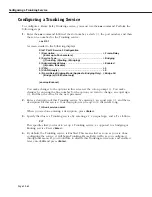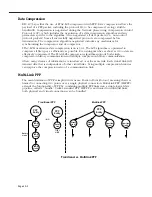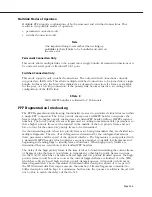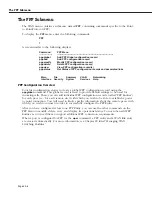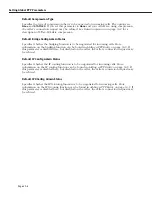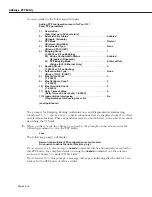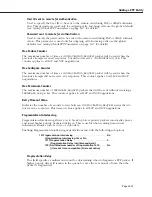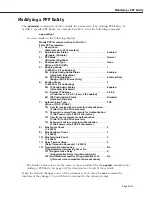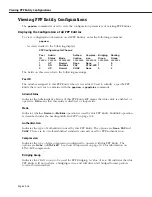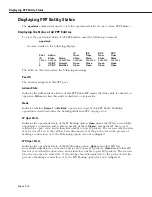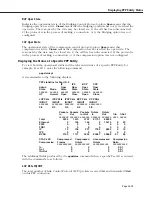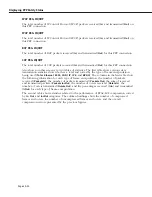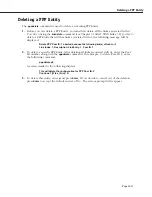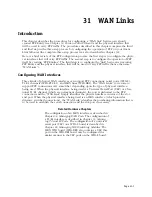
Adding a PPP Entity
Page 30-9
Adding a PPP Entity
The
pppadd
command is used to add a PPP Entity configuration record. The PPP Entities you
create are identified by numbers called Peer IDs. When you enter the
pppadd
command, you
may enter a Peer ID number with the command like this:
pppadd <ID number>
Alternatively, you can enter the command alone and you will be prompted for a Peer ID. The
prompt will identify the next available, unique ID number.
After you enter the
pppadd
command as described above, a screen will be displayed that
contains the configuration parameters that make up the PPP Entity. The steps that begin
below will take you through the process of adding a PPP Entity.
After you have set the PPP Entity’s configuration parameters, you must save them to actually
create the PPP Entity. After saving, you will be prompted to add one or more links to be used
with the PPP Entity. In other words, the software will automatically issue a
linkadd
command
for you. This was designed to help you to quickly create working PPP Entities as they must
be associated with at least one link in order to operate. The
linkadd
command, as well as the
other commands on the Link menu, are described in Chapter 31 titled
“
Wan Links.”
1.
To add a PPP Entity, enter the following command:
pppadd
A screen similar to the following will display:
Add PPP configuration record. Please specify a unique
ID number to identify this record and the remote Peer to communicate with.
Peer ID (1):
This prompt is asking you to enter a Peer ID as well as indicating that the next available
number is 1. If other Peers have already been configured, the number indicated will be
different than is shown above.
2.
To answer the prompt, for example, for Peer ID 1, you would enter the following
command:
1
If you have enabled the verbose mode, you will see the following text immediately before
the prompts:
To change a value, enter the corresponding number, an ‘=’, and the new
value. For example to set a new description, use
: 2=My new Description
To clear an entry specify the value as ‘.’ as in
2=.
When complete enter “save” to save all changes, or cancel or Ctrl-C to
cancel all changes. Enter ? to view the new configuration.
This text provides brief help on entering commands at the following screens. In the steps
that follow below, this help text will
not
be shown.
Summary of Contents for Omni Switch/Router
Page 1: ...Part No 060166 10 Rev C March 2005 Omni Switch Router User Manual Release 4 5 www alcatel com ...
Page 4: ...page iv ...
Page 110: ...WAN Modules Page 3 40 ...
Page 156: ...UI Table Filtering Using Search and Filter Commands Page 4 46 ...
Page 164: ...Using ZMODEM Page 5 8 ...
Page 186: ...Displaying and Setting the Swap State Page 6 22 ...
Page 202: ...Creating a New File System Page 7 16 ...
Page 270: ...Displaying Secure Access Entries in the MPM Log Page 10 14 ...
Page 430: ...OmniChannel Page 15 16 ...
Page 496: ...Configuring Source Route to Transparent Bridging Page 17 48 ...
Page 542: ...Dissimilar LAN Switching Capabilities Page 18 46 ...
Page 646: ...Application Example DHCP Policies Page 20 30 ...
Page 660: ...GMAP Page 21 14 ...
Page 710: ...Viewing the Virtual Interface of Multicast VLANs Page 23 16 ...
Page 722: ...Application Example 5 Page 24 12 ...
Page 788: ...Viewing UDP Relay Statistics Page 26 24 ...
Page 872: ...The WAN Port Software Menu Page 28 46 ...
Page 960: ...Deleting a PPP Entity Page 30 22 ...
Page 978: ...Displaying Link Status Page 31 18 ...
Page 988: ...Displaying ISDN Configuration Entry Status Page 32 10 ...
Page 1024: ...Backup Services Commands Page 34 14 ...
Page 1062: ...Diagnostic Test Cable Schematics Page 36 24 ...
Page 1072: ...Configuring a Switch with an MPX Page A 10 ...
Page 1086: ...Page B 14 ...
Page 1100: ...Page I 14 Index ...


